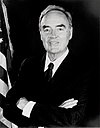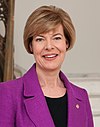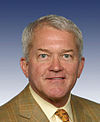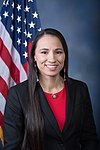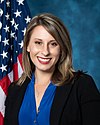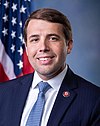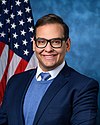
Since Arizona became a U.S. state in 1912, it has sent congressional delegations to the United States Senate and United States House of Representatives, beginning with the 63rd United States Congress in 1913. Before becoming a state, the Arizona Territory elected a non-voting delegate at-large to Congress from 1864 to 1912. Each state elects two senators to serve for six years, and varying numbers of members of the House, depending on state population, to two-year terms. Arizona has sent nine members to the House in each delegation since the 2010 United States Census.

LGBTQ+ Victory Fund, commonly shortened to Victory Fund, is an American political action committee dedicated to increasing the number of out LGBTQ+ public officials in the United States. Victory Fund is the largest LGBTQ+ political action committee in the United States and one of the nation's largest non-connected PACs.
Women have served in the United States House of Representatives, the lower chamber of the United States Congress, since 1917 following the election of Republican Jeannette Rankin from Montana, the first woman in Congress. In total, 378 women have been U.S. representatives and seven more have been non-voting delegates. As of November 12, 2024, there are 127 women in the U.S. House of Representatives, making women 29.2% of the total. Of the 385 women who have served in the House, 253 have been Democrats and 132 have been Republicans. One woman was the 52nd Speaker of the House, Democrat Nancy Pelosi of California.
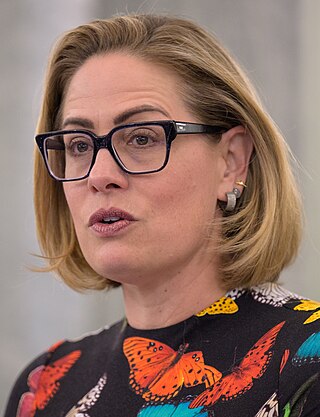
Kyrsten Lea Sinema is an American politician and former social worker serving as the senior United States senator from Arizona, a seat she has held since 2019. A former member of the Democratic Party, Sinema became an independent in December 2022.

The Congressional Equality Caucus, formerly the Congressional LGBTQ+ Caucus, was formed by openly gay representatives Tammy Baldwin and Barney Frank on June 4, 2008, to advance LGBT+ rights. The caucus is chaired by the most senior member and is co-chaired by nine of the United States House of Representatives' ten current openly LGBT members; during the 118th Congress, the caucus is chaired by Representative Mark Pocan and is co-chaired by representatives Becca Balint, Angie Craig, Sharice Davids, Robert Garcia, Chris Pappas, Mark Pocan, Eric Sorensen, Mark Takano, and Ritchie Torres.
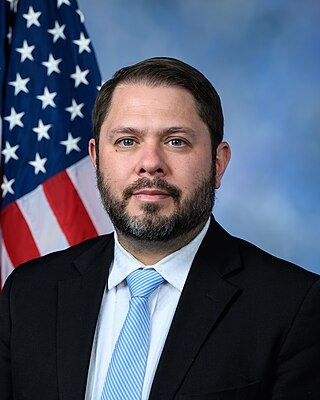
Rubén Marinelarena Gallego is an American politician who is a United States senator-elect from Arizona. He has served as the U.S. representative for Arizona's 3rd congressional district since 2015. A member of the Democratic Party, Gallego was a member of the Arizona House of Representatives, where he was assistant minority leader from 2012 until he resigned to run for Congress. Gallego was first elected to Congress in 2014. His district includes most of southern, western, and downtown Phoenix, and part of Glendale, where he served four terms in the House.

The first English-language use of the word "bisexual" to refer to sexual orientation occurred in 1892.

Sarah Elizabeth McBride is an American activist and politician who is the U.S. representative-elect for Delaware's at-large congressional district. A member of the Democratic Party, she has served in the Delaware Senate since January 2021, representing the state's 1st senate district. Prior, she was the national press secretary of the Human Rights Campaign from 2016 to 2021. As the first openly transgender state senator in the country, she is the highest-ranking openly transgender elected official in United States history.

The 2018 United States Senate election in Arizona took place on November 6, 2018. Incumbent Republican Senator Jeff Flake did not seek a second term. The election was held concurrently with a gubernatorial election, other elections to the U.S. Senate, elections to the U.S. House of Representatives, and various other state and local elections.

Raquel Terán is an American politician who previously served as a member of the Arizona Senate from the 26th district. She previously served in the Arizona House of Representatives and as chair of the Arizona Democratic Party.

The following is a timeline of lesbian, gay, bisexual, transgender and queer (LGBTQ) history in the 21st century.

Julie Elizabeth Johnson is an American politician from the state of Texas. A member of the Democratic Party, she is the member-elect to the United States House of Representatives for Texas's 32nd congressional district. She serves in the Texas House of Representatives for District 115.

The 2024 United States House of Representatives elections were held on November 5, 2024, as part of the 2024 United States elections, to elect the 441 members of the House of Representatives - representatives from all 435 congressional districts across each of the 50 U.S. states, as well as 6 non-voting delegates from the District of Columbia and the inhabited U.S. territories to the United States House of Representatives. Special elections have also been held on various dates in 2024. Numerous other federal, state, and local elections, including the U.S. presidential election and elections to the Senate, were also held on this date. The winners of this election will serve in the 119th United States Congress, with seats apportioned among the states based on the 2020 United States census.
The "rainbow wave" was a phrase coined in 2018 to describe the unparalleled number of openly LGBTQ+ candidates running for political office in the United States that year. The rainbow wave began during the 2018 U.S. midterm elections when over 400 LGBTQ+ candidates ran for office and a record-breaking 244 were elected.
